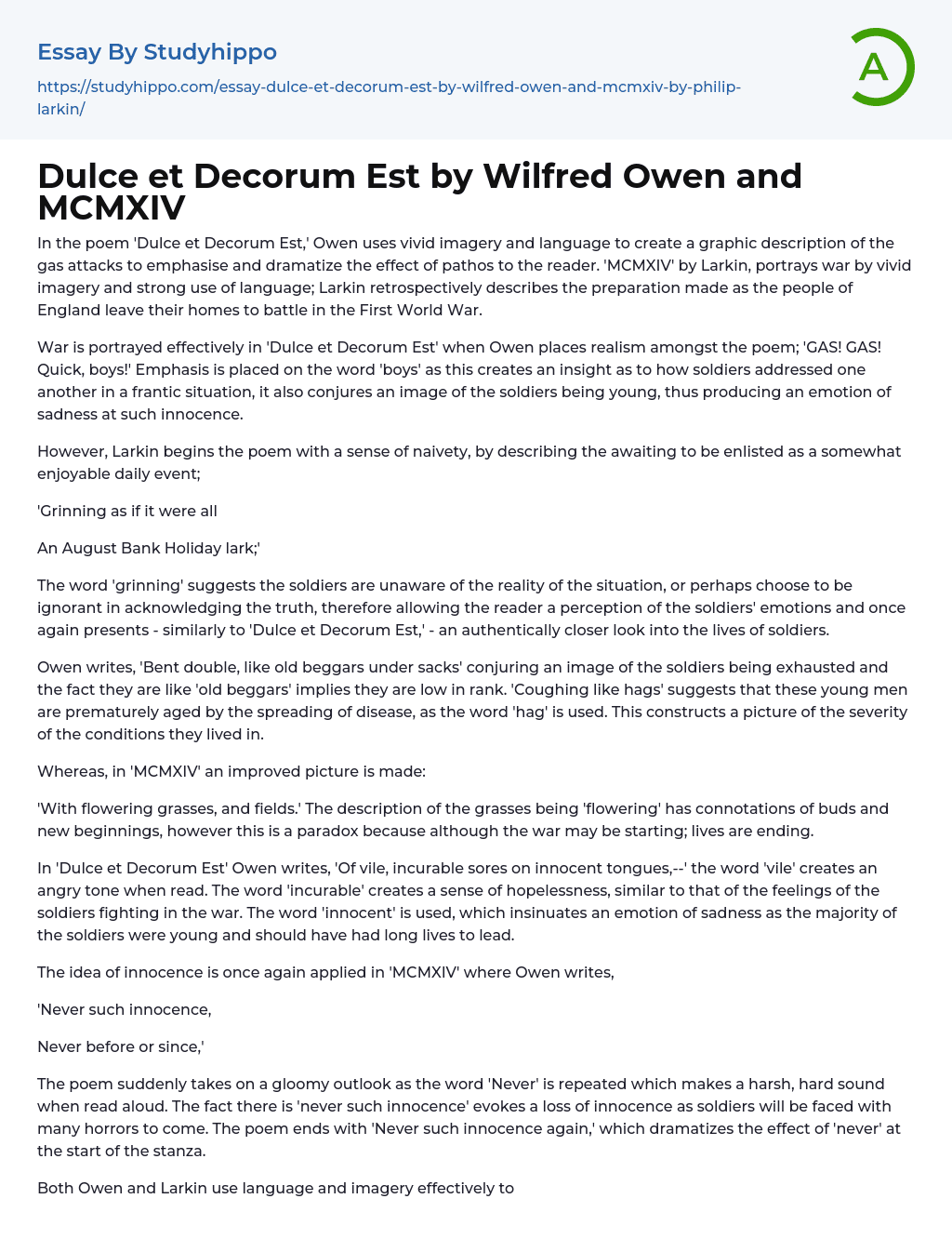

Dulce et Decorum Est by Wilfred Owen and MCMXIV Essay Example
Owen's poem 'Dulce et Decorum Est' uses vivid imagery and language to create a powerful depiction of gas attacks, emphasizing the use of pathos on the reader. Similarly, Larkin's 'MCMXIV' portrays war through vivid imagery and strong language, illustrating the preparations made by the people of England as they leave their homes to fight in World War I.
War is depicted powerfully in 'Dulce et Decorum Est' through Owen's use of realism in the poem. The exclamation 'GAS! GAS! Quick, boys!' is significant as it reveals how soldiers communicated in a frantic situation and evokes an image of young soldiers. This evokes a sense of sadness at their innocence.
Nevertheless, Larkin initiates the poem with a feeling of innocence, portraying the anticipation of enlistment as a somewhat pleasurable routine:
'Grinning as if it were all
An August Bank Holiday lark;'
The te
rm 'grinning' implies that the soldiers are oblivious to the harsh reality or deliberately ignorant in acknowledging it. This provides the reader with an insight into the soldiers' emotions and, like 'Dulce et Decorum Est,' offers an authentic depiction of their lives.
The author, Owen, describes the soldiers as being bent double, like old beggars under sacks. This creates an image of their exhaustion and implies that they have low rank. Additionally, the phrase "coughing like hags" suggests that these young men have aged prematurely due to disease. By using the word "hag," it portrays the severity of the conditions they experienced.
The poem 'MCMXIV' presents an enhanced image with the mention of "flowering grasses" and fields. The use of the term "flowering" suggests the presence of buds and new beginnings. However, this description creates a paradox as the war
symbolizing an ending, is also taking place.
In his poem 'Dulce et Decorum Est,' Owen expresses anger through the use of the word 'vile' while describing the presence of incurable sores on innocent tongues. This word choice evokes a sense of despair, mirroring the feelings experienced by soldiers in war. Furthermore, the inclusion of the word 'innocent' invokes sadness, highlighting the youth of the soldiers who should have had promising futures ahead of them.
In 'MCMXIV,' Owen explores the concept of innocence, noting that it has never been experienced before or since. The repetition of the word 'Never' in the poem creates a somber tone and emphasizes the harsh reality that innocence will be lost as soldiers confront countless horrors. The stanza concludes with the line 'Never such innocence again,' effectively highlighting the profound impact of 'never' from the beginning of the stanza.
Both Owen and Larkin employ language and imagery skillfully to create powerful poems that depict the realities of war and the accompanying emotions. Although the two poets express their ideas and viewpoints in unique ways, there is a prevailing atmosphere of death and sadness throughout.
- Book Summary essays
- Metaphor essays
- Reader essays
- Rhyme essays
- Literary devices essays
- Villain essays
- Books essays
- Genre essays
- Literary Criticism essays
- Writer essays
- Protagonist essays
- Simile essays
- Poem essays
- Book Report essays
- Book Review essays
- Greek Mythology essays
- Plot essays
- Tragic Hero essays
- Coming of Age essays
- Play essays
- Rhetoric essays
- Rhetorical Question essays
- Translation essays
- Understanding essays
- Reason essays
- Character essays
- Letter essays
- American Literature essays
- Literature Review essays
- Utopia essays
- Poetry Analysis essays
- Dante's Inferno essays
- Between The World and Me essays
- Incidents in The Life of a Slave Girl essays
- Flowers for Algernon essays
- Myth essays
- Everyday Use essays
- Boo Radley essays
- Genesis essays
- Richard iii essays
- Alice in Wonderland essays
- On the road essays
- Ozymandias essays
- The Nightingale essays
- Holden Caulfield essays
- Animal Farm essays
- 1984 essays
- A Hanging essays
- Shooting An Elephant essays
- A Tale Of Two Cities essays



